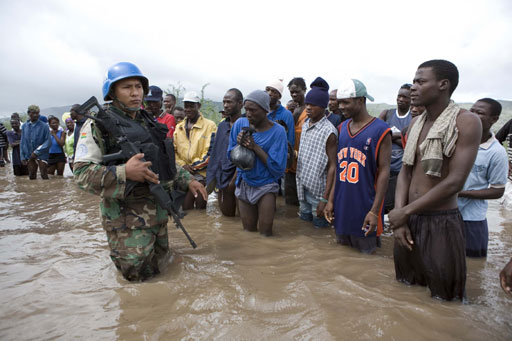Sent to you by Zeeshan via Google Reader:
Newly minted USAID administrator Rajiv Shah stopped by the operations hub of the Haiti crisis response management team on the ninth floor of the Ronald Reagan building Monday morning, as the response effort shifts from lifesaving to food aid and eventually, development.
Shah was accompanied by World Food Programme Executive Director Josette Sheeran, formerly head of the State Department's Economics, Business, and Cultural Affairs bureau. Both officials traveled to Haiti over the weekend and reported that while rescue efforts are giving way to food and medical aid, the long-term needs and plans are still unknown.
"We're just assessing the magnitude of the damage and challenges ahead," said Sheeran. "What's important is the commitment of the world to stand by them beyond the crisis phase, which we're not out of yet... I don't think we yet know the full dimension of the problem."
"Our primary goal for the next few weeks is to support the WFP and support the capacity they have ... to reach as many Haitians as possible with food, water, and other critically needed supplies," said Shah.
WFP has delivered more than 1.5 million rations in the 10 days immediately after the earthquake and is ramping up that flow of meals every day. The rations are mostly what are called High Energy Biscuits so far, but now there is a drive to switch to regular commodities like rice, oil, and salt.
New sea and land routes are being opened up, the U.S. military is supporting food-distribution efforts by helicopter, and the first of a number of landing boats that can bring food right to the beach will arrive soon.
[[BREAK]]
The core office pictured here will probably last only until the end of February, said one USAID official who was authorized to speak only on background. Plans for the response management team overall extend to the end of the 2010 calendar year. After that, most ground efforts will be rolled up and all Haiti efforts will probably shift back to USAID's regional bureau, the official said.
Shah gave no specific details about how the U.S. was thinking about the long-term Haiti commitment saying, "We were there before for a long time; we will be there going forward."
USAID is draining funds from its emergency and regular accounts to pay for the mission, but will need that funding replenished sooner rather than later.
"We're hoping on a pretty robust supplemental," the USAID official said.
One major question is over whether USAID really has a say in how the airport in Port-au-Prince, which is managed now by U.S. Southern Command, functions.
"DOD maintains control of the airport at this time," the official said, adding that about 150 to180 flights per day is the maximum rate. A spokesman for USAID said that USAID is involved in setting the priority for which flights get those spots.
Another emerging issue is whether the U.S. is actively searching for and dealing with refugees who may try to get to the United States. No refugees have been caught trying to make their way from Haiti to the United States. That's odd, considering that Haitians who are in the U.S. illegally have been given 18 months of amnesty from deportation, raising their incentive to make the trip.
So is the U.S. is just too busy to catch fleeing refugees? Or has there been some determination made to deprioritize that issue? Shah said the Coast Guard is on the job and closely monitoring the situation.
Things you can do from here:













 We've covered how technology has shaped relief efforts in
We've covered how technology has shaped relief efforts in 